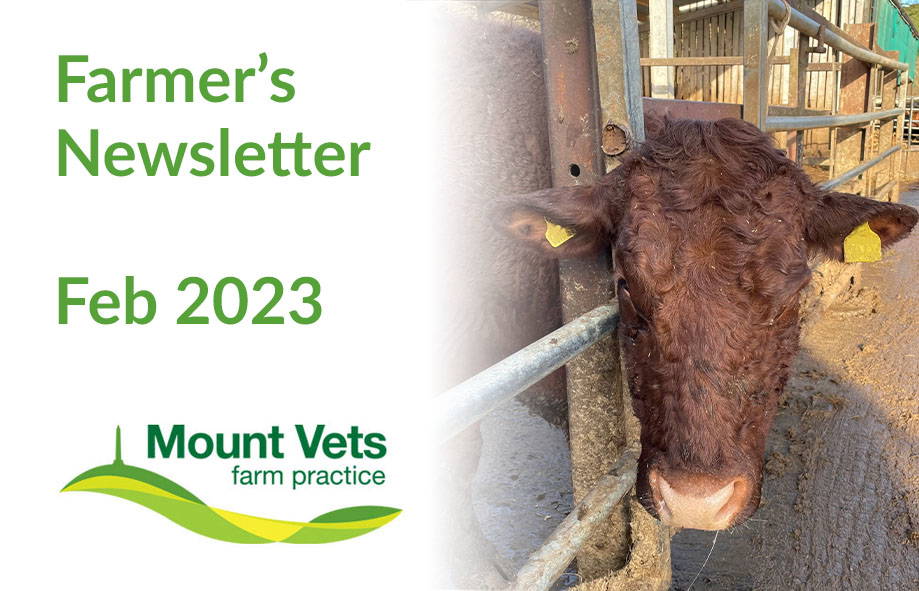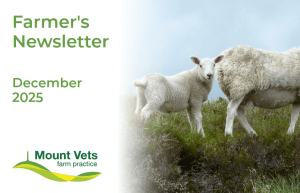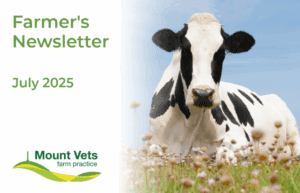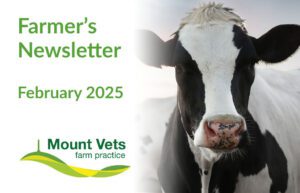February 2023
Here is the latest from our farm team at Mount Vets. If you would like any further advice or would like us to cover something in the next newsletter, please call us on 01823 662286 or contact us here.
We want to hear your feedback… Leave us a review!
Our new website is now live. We hope you enjoy an easier navigation through the pages and have had the opportunity to look at the new information that we have added. We value your feedback and comments and would appreciate if you could take the time to leave us a review! Please follow the link to share your thoughts. https://g.page/r/CTSyP_UXvSPIEAI/reviewWhen Cheap Silage Becomes Expensive Silage
Every now and then we see a clinical case so “textbook” that we simply have to snap a photo, and this was exactly the case this month for me. Listerial meningitis (or just Listeriosis) is a neurological condition caused by the bacterium Listeria monocytogenes that lives in soil and some plant matter. The above-optimal pH of spoiled or mouldy silage (pH >5) allows for these bacteria to survive and flourish due to incomplete fermentation.
Following ingestion, the bacteria can sometimes gain entry to an important nerve controlling the muscles on one side of an animal’s face, through small abrasions in the mouth (or shed teeth as is often the case in yearlings) before following the nerve up into the brain. Here it is well protected from the immune system and any systemic antibiotics we may administer, requiring prolonged courses of very high dose antibiotics. If any of the symptoms below sound familiar, call your vet to discuss the best treatment option as soon as possible.
This Devon cow pictured had been one of a group of pregnant sucklers due to calve this spring. Due to tight feed stocks (no surprise after this drought summer), the owner was forced to source some emergency silage bales which turned out to have been cut and baled somewhat roughly – to the extent that the owner reported finding visible clumps of soil inside the bales, though he had thought they were eating around them. As you may be able to make out, her right eyelid was ever so slightly drooping relative to the left, and she is clearly drooling from the right side of her mouth. Aside from missing the “classic” droopy ear, we have the early calling cards of Listeria – due to the damage done to a nerve on one side of the face, creating this “stroke-like” facial asymmetry.
When I arrived, she was leaning insistently against this fence post for balance and would not be moved, even as I injected her. Cattle with this condition have a strange “propulsive tendency” and are often found wedged into corners, cubicles, or fences – often pressing their head into walls. As the condition worsens they can also end up circling incessantly. What is not obvious from the photo is the slightly hunched back, leading the owner to wonder if she had bellyache. She may well have done, as they struggle to swallow properly due to the nerve damage, resulting in drooling and saliva loss. The rumen content dries out as a result, leading to rumen impaction and abdominal pain – this can manifest also as teeth grinding and grunting.
It’s beyond this article to fully lecture you all on proper silaging technique but good fermentation is aided through cutting grass at an early growth stage containing high fermentable sugar content, wilting for 24 hours and the use of organic acid or sugar-based silage additives. Ensuring a tight seal on all bales/clamps and care while moving and stacking bales to ensure the integrity of the wrap seal is paramount to preventing aerobic bacterial multiplication within the bale and spoilage. Reduce soil contamination of the silage by rolling grass fields at the beginning of the growing season.
Feeding Ewes for Quality Colostrum
A lot is said about the colostrum management after it has left the ewe but spare a thought for it prior to this. Dietary energy is likely to be the most frequent limiting factor on colostrum production in ewes.
Under nutrition of ewes will not only reduce the energy content of the colostrum (this is vital for survival of lambs in the first 24h of life), but it will also decrease the quantity she produces. This is also seen with an increase in thickness, which makes for harder tubing/bottle feeding/suckling. It’s also been proven that ewes who are lacking in energy will have impaired milk production overall.
It is the last 6 weeks of pregnancy where ewes are battling two opposing factors – consuming enough energy to sustain lamb growth, but as the lamb gets larger, it will take up more room in her abdomen, meaning she will struggle to physically fit in the feed needed. This is exacerbated by feed that is not sufficient in quality. The results are poor colostrum, small lambs, twin lamb disease… the list goes on.
There are ways of combating this issue:
- Analyse your forage – this removes the guessing game as to what you should be feeding your ewes. This will allow efficient use of feed stuffs, reducing waste and ensuring requirements are met.
- Supplement with concentrates – this will vary according to how many lambs she is carrying. Again, this should be used in line with forage analysis, so you are not wasting feed.
- Scanning – by finding out how many lambs she is carrying, you will be able to adjust the previous points in accordance with your results.
- Metabolic profiling – blood sampling ewes 3-4 weeks ahead of lambing will allow us to analyse if the above efforts are working. By measuring energy levels, we can adjust the diet in time to have an effect prior to lambing to try and mitigate the effects of poor nutrition. The cost is not unreasonable, at around a tenner per ewe. We can do a sample of each group (singles/twins/triplets) to allow proper monitoring.
MSD Flock Check Is Back – Investigate Your Abortions and Empty Ewes
Abortions or stillbirths in ewes are common and the occasional abortion event can be expected each year at lambing time (less than 2% of all ewes scanned pregnant would be normal for a season). However, any more than this, or if you are finding more than one abortion in a week in unsynchronised flocks, you should certainly be looking to investigate a potential infectious cause.
Any aborting ewes should always be isolated immediately to a pen or shed that will not be used for lambing ewes that year. Any abortion products (lambs and placenta) should be collected wearing gloves, along with any straw that visibly contacted these. Give us a ring and coordinate with us whether to drop the lambs and placenta (in a feed bag or similar) down to Starcross (preferable) or to us for testing. If not testing, dispose of all abortion products in a covered bin which will not allow access by rodents, farm cats or dogs.
There are several causes of infectious abortion in ewes and some of them we can do something about that season (i.e., preventative whole-flock treatment with long acting oxytetracycline in the face of an Enzootic Abortion storm) and some that we can only really vaccinate for next year – Enzootic Abortion and Toxoplasmosis).
Through the Flock Check scheme, MSD will subsidise the cost of 8 blood samples for EAE and Toxoplasmosis, though you will still be required to pay for the visit and some time taking the samples. Talk to your vet about when and how these blood samples would be best utilised, as often the best diagnostics in the thick of an abortion storm are the lambs/placenta themselves. In the aftermath, because antibodies can take weeks to develop, blood sampling becomes more useful – especially when sampling ewes known to have aborted, produced stillborn lambs, or failed to lamb at all.
Bovine TB Meeting
Thank you to everyone who came along to our meeting about Bovine TB and controlling the controllables at the Beambridge Inn. It was great to have so many people in the room discussing and engaging with TB control. As we said during the meeting, the bTB situation in the Southwest has improved over the last several years due to a range of factors and we are at a 20-year low in new herd infections. Now is the time to consolidate this success and continue to treat bTB as we do with all the other infectious diseases that we deal with.
Cattle to Cattle Spread
Purchasing animals always brings with it a degree of risk and Bovine TB is no different. This risk can be reduced by limiting the number of animals bought onto the farm and researching the seller’s TB history before purchase. The ibTB website is an excellent resource that can be used by everyone.
ibTB – Mapping bovine TB (bTB) in England and Wales
Cattle-to-cattle spread within the herd can be reduced by ensuring the animals are as healthy as possible and stocking densities aren’t too high. Water troughs can play a big role in transmission as M. bovis can survive for up to 60 days in water, cleaning and disinfecting troughs regularly is therefore very important.
Wildlife Transmission
bTB spread from wildlife to cattle is an important route of transmission for new breakdowns but can also be an emotive and contentious issue. There is a lot that can be done on farm to limit the transmission of bTB from wildlife to cattle that doesn’t rely on Government Policy, and we should continue to engage with these measures despite changing policy.
The main focus for reducing wildlife transmission is limiting the access that wildlife has to cattle feed and water, and limiting the access that cattle have to badger setts and latrines. This can be achieved without limited downside to cattle. Raising water and feed troughs discourages badger access. Badger setts and latrines can easily be fenced off with electric wire to stop cattle from accessing them. Stored cattle feed and housing should be secured to prevent wildlife access when not in use.
For any further advice related to bTB or to book in a TBAS advice visit, please contact us at the practice.
Upcoming courses
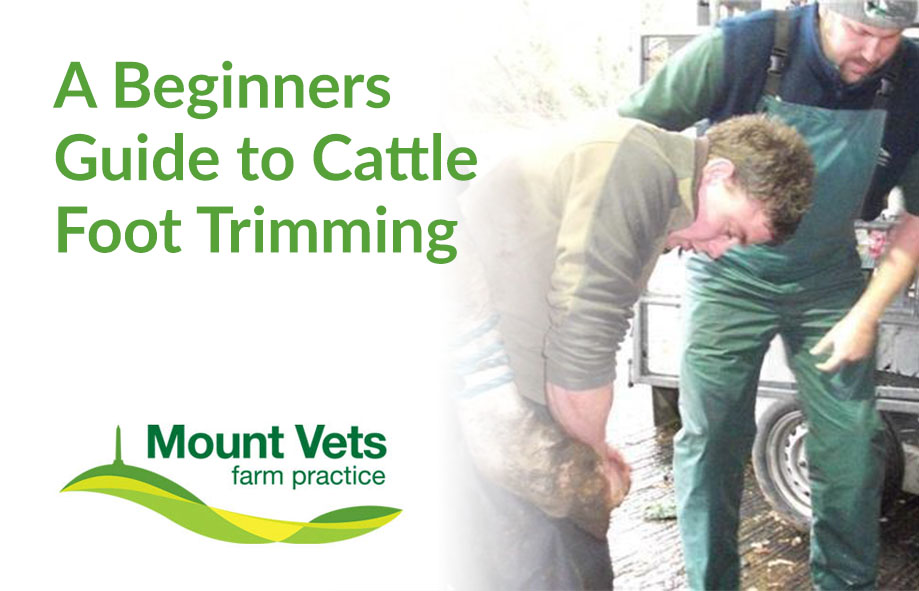
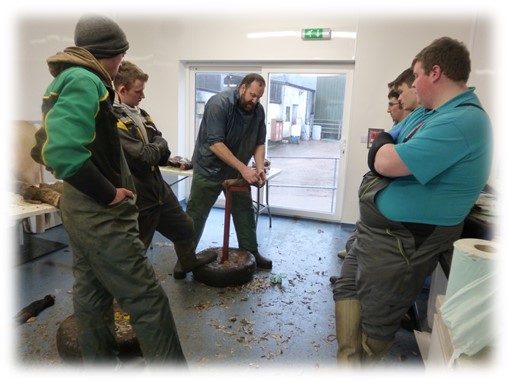
FOOT TRIMMING
7th March 2023 | 10:30am-4pm
Are you a young dairy farmer or dairy farm worker that is keen to learn how to carry out routine foot trimming on your farm?
If so, this course is for you!
The day aims to teach the Dutch 5 step technique, which is used all round the world. This course will teach you the rudimentary techniques as well as allow you to practice on several feet on the day. You will also learn more about the overall control of lameness within the herd.
The course covers:
☑️ Foot anatomy
☑️ The 5-step technique
☑️ Hands on foot trimming
☑️ Infectious and non-infectious lameness
☑️ Locomotion scoring
☑️ Bandaging and blocking feet
Course fees:
£25 if YFC age (with funding from Laura Persey Trust)
£100 for over YFC as an unsubsidised fee.
Please ring the practice to book your place on any of our courses on 01823 662286 or email farm@mountvets.com
Have a question about any of the topics covered in this newsletter?
If you need any assistance with the topics covered in this newsletter, please do not hesitate to get in touch with our experienced farm vets who will be able to help. Call 01823 662286, or contact us here.
